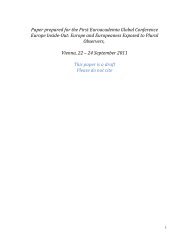Emanuel Crudu The EU and Collective Identities ... - Euroacademia
Emanuel Crudu The EU and Collective Identities ... - Euroacademia
Emanuel Crudu The EU and Collective Identities ... - Euroacademia
Create successful ePaper yourself
Turn your PDF publications into a flip-book with our unique Google optimized e-Paper software.
<strong>The</strong> <strong>EU</strong> <strong>and</strong> <strong>Collective</strong> <strong>Identities</strong>: What Use For A <strong>EU</strong>ropean<br />
Identity<br />
<strong>Emanuel</strong> <strong>Crudu</strong><br />
IMT Institute for Advanced Studies, Lucca<br />
<strong>The</strong> advance <strong>and</strong> transfiguration of the initial project of an ‘ever closer union’ brought about <strong>and</strong> intensified the<br />
searches <strong>and</strong> disputes on <strong>and</strong> around the idea of an emergent <strong>EU</strong>ropean identity (Herrmann et al., 2004; Checkel <strong>and</strong><br />
Katzenstein, 2009). However the search for the substance, determinants, manifestations or specific features of such an<br />
identity opened the way for the image of an ‘identitarian Babel’ (Trenz 2010) as a proxy for the degree of unity <strong>and</strong><br />
consensus or articulate dialogical contestation within the processes of tracing or creating a <strong>EU</strong> collective identity. So<br />
far the <strong>EU</strong>ropean identity cant is either a disciplinary debate within the frame of European studies in search of<br />
legitimacy for the <strong>EU</strong> institutions or an elite narrative that is compelled to confront its own fictive design when facing<br />
the ‘failed Europeanization of the masses’ (Majone, 2009). Moreover, any discussion of the <strong>EU</strong>ropean identity<br />
maximizes the degree <strong>and</strong> the level of its conceptually contested nature: identity is a contested concept, collective<br />
identity is an even more contested one, the idea of Europe is the playground of contestation itself while <strong>EU</strong>’s nature of<br />
being an Unidentified Political Object 1 does not make things any easier.<br />
Dealing with the <strong>EU</strong>ropean identity means to integrate contestation into contestation until potentially a n degree of<br />
contestation. Due to the confusion between identities <strong>and</strong> identifications, that is particularly emphatic within the <strong>EU</strong><br />
studies, some scholars dem<strong>and</strong>ed that the concept of identity shall be ab<strong>and</strong>oned (Brubaker <strong>and</strong> Cooper, 2000). Ruth<br />
Wittlinger argued as well that in the current context of the <strong>EU</strong>, that ‘the lack of a European identity does not<br />
necessarily have to be seen as a severe flaw’ (Wittlinger 2009: 380). However, inside the <strong>EU</strong>, identitarian issues<br />
turned out to be efficient tools for politicization of a ‘constraining dissensus’ (Hooghe <strong>and</strong> Marks 2009) while<br />
universalizing terms included in the making of the <strong>EU</strong>ropean identity usually tend or intend to obscure the localized<br />
origins of any identitarian project (Case 2009: 131). <strong>EU</strong> identity as conceptually used is rather an intentional concept:<br />
it doesn’t say anything about its sphere but rather defining its sphere explicitates the aim of its usage. It is not ‘identity<br />
of’ but ‘identity to’.<br />
Without enrolling to any school of suspicion, there are no innocent uses of such an idea since any conception of a<br />
<strong>EU</strong> identity in use can include <strong>and</strong> exclude by dissecting at free will. By pursuing specific predetermined political<br />
purposes it demarcates who is inside <strong>and</strong> who is outside, who is in the core <strong>and</strong> who is in the periphery. Yet, if such an<br />
inclusion/exclusion nexus is available for any type of identity <strong>and</strong> constitutive to it, a <strong>EU</strong> collective identity has no real<br />
or fictional substratum <strong>and</strong> can therefore only count on circumstantial opportunistic appropriations from wider cultural<br />
frames (Laffan 2004:75). <strong>The</strong> <strong>EU</strong> invokes a particular selective identity by structuring particular types of cultural<br />
policies that seclude between what is appropriate or not for a rather vulnerable political project. <strong>The</strong> value of such<br />
appropriations is always approximate <strong>and</strong> can only be assessed by their exclusive performative functions within the<br />
<strong>EU</strong> deliberate goals, strategies <strong>and</strong> policies that are most of the times in flux <strong>and</strong> subjected to the logic of the fait<br />
accompli. <strong>EU</strong>ropean processes of identity construction are therefore purposeful political engineering derived from<br />
circumstantial political choices (Checkel <strong>and</strong> Katzenstein 2009: 3). Yet, there is no Pareto efficiency when it’s about<br />
identity <strong>and</strong> there is no median <strong>EU</strong>ropean to safeguard.<br />
<strong>The</strong> idea of <strong>EU</strong>ropean identity brings with it whenever it’s used the specific <strong>and</strong> therefore exclusive features that<br />
one intends. Hence the fictional dimension of <strong>EU</strong> identity making does imply to put under the appearance of unity <strong>and</strong><br />
continuity elements of the realm that are otherwise disparate <strong>and</strong> discontinue. Students of <strong>EU</strong>ropean identity are most<br />
often voluntary or involuntary supporters of a ready-made idea of the <strong>EU</strong>. Yet acknowledging the beneficial <strong>and</strong><br />
progressive nature of the <strong>EU</strong> in a wide variety of domains of political, social or economical realms in Europe <strong>and</strong><br />
outside does not necessarily require to transform limited <strong>and</strong> occasional identifications in a stronger identitarian<br />
package whose unintended consequences can easily exclude or function against the very values is thought to instill.<br />
<strong>The</strong> paradox of the <strong>EU</strong>ropean identity is that clarifying it more means leaving out so much that such an exclusion<br />
becomes an act of contradiction in itself as it opposes any minimal content of such an identity. <strong>The</strong> only form of<br />
clarifying any type of <strong>EU</strong>ropean identity is criticizing it. But European identity as conceptualized in the frame of <strong>EU</strong><br />
politics is nothing more than a political engineering on behalf or sometimes against the <strong>EU</strong>. It excludes <strong>and</strong> it is<br />
counterproductive. If it’s about European values <strong>and</strong> the <strong>EU</strong> wants to be a truly normative power it should start<br />
following them <strong>and</strong> recognize Europeaness in all its plenitude as an inclusive <strong>and</strong> embracing idea. <strong>The</strong>re is no<br />
<strong>EU</strong>ropean identity but there is a wider European patrimonial identity.<br />
2











